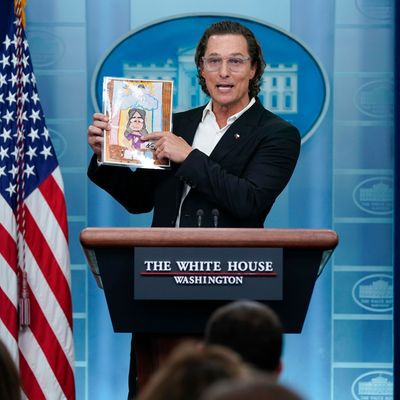
Matthew McConaughey took the podium at the White House Briefing Room on Tuesday to make an impassioned case for gun reform two weeks after the massacre at an elementary school in his hometown of Uvalde, Texas.
In an extended speech, the actor, who had flirted with running for governor of Texas, used the 21 victims’ stories to press his case for federal action as senators continue to try to reach an incremental compromise on guns. “We need to invest in mental-health care. We need safer schools. We need to restrain sensationalized media coverage. We need to restore our family values, we need to restore our American values, and we need responsible gun ownership,” McConaughey said, according to the AP. “Is this a cure-all? Hell no. But people are hurting.”
McConaughey listed the victims’ names and provided personal details about many of the murdered fourth-graders. In one harrowing moment, he asked his wife, Camila, to hold up the green Converse sneakers that belonged to 10-year-old Maite Yuleana Rodriguez, who McConaughey said had wanted to be a marine biologist. Those shoes, he continued, were the only way of identifying Maite after she was shot by the AR15-wielding gunman. McConaughey then slammed the podium.
McConaughey framed potential new laws as beneficial to the large majority of gun owners, who he said were “fed up” by a small minority who break the law.
And he emphasized that the massacre in Texas had changed the debate on a usually intractable issue. “We are in a window of opportunity right now that we have not been in before,” he said. “A window where it seems like real change can happen.”
McConaughey’s initial statement after the shooting didn’t mention guns, but in recent days, he has argued that the status quo on firearm regulations is untenable while being careful to stress that he fully supports gun ownership. In an Austin American-Statesman editorial published on Monday, he framed his proposals as “gun responsibility” and called for universal background checks, a minimum age of 21 to buy assault-style rifles, waiting periods for the purchase of those rifles, and a federal red-flag law that would allow courts to strip people of firearms whom they deem to be dangerous. Of those proposals, only the last one appears to have a chance of becoming law.






























